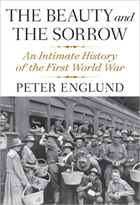
By Peter Englund
Alfred A. Knopf, $35.00, 540 pages
Peter Englund’s book brings the stories of lost men and women into our own time and makes fresh a catastrophe as remote from us as the Spanish Flu epidemic. He does us a service in presenting this humane recollection of the West’s apocalypse: we’ve never recovered from it and never shall; too few understand that.
Englund is a Swede whose scholarship and writing is esteemed in his homeland, and this book tells us why. He gives the readers tales of nearly a score of men and women who were swept into the battle: a Venezuelan cavalryman in the Ottoman army, a Scottish aid worker, and a German schoolgirl, to name a few. Well translated, the narrative has a colloquial patina that allows it to impart its information with a skilled novelist’s drive and ear.
“There is a story I tried to tell…the story of men who played football…between the enemy’s line of trenches and our own…a friend of mine said, ‘What did they do that for?’ (oh yea gods, have pity on men and women who suffer from fatty degeneration of the soul!).”
Englund’s mix of direct quotation, journal extracts, and his own narrative makes each person alive, distinct and unique in their common journey through war. Fittingly, his coda or envoi indicates the measure of the war’s failure and the future that its outcome has dictated. Like the outbreak of an uncontainable contagion or a tectonic earthquake, war is inevitable. This history’s odd beauty is a vital solace for us as we swim in the sad swirl of the first war’s ripples.
Larry A. LaBeck
[amazon asin=030759386X&text=Buy On Amazon&template=carousel]
